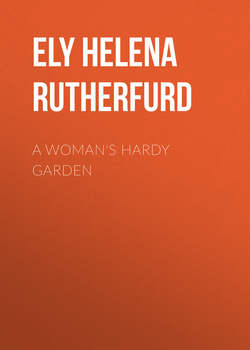Читать книгу A Woman's Hardy Garden - Ely Helena Rutherfurd - Страница 3
INTRODUCTION
ОглавлениеCHAPTER I
INTRODUCTION
Love of flowers and all things green and growing is with many men and women a passion so strong that it often seems to be a sort of primal instinct, coming down through generation after generation, from the first man who was put into a garden “to dress it and to keep it.” People whose lives, and those of their parents before them, have been spent in dingy tenements, and whose only garden is a rickety soap-box high up on a fire-escape, share this love, which must have a plant to tend, with those whose gardens cover acres and whose plants have been gathered from all the countries of the world. How often in summer, when called to town, and when driving through the squalid streets to the ferries or riding on the elevated road, one sees these gardens of the poor. Sometimes they are only a Geranium or two, or the gay Petunia. Often a tall Sunflower, or a Tomato plant red with fruit. These efforts tell of the love for the growing things, and of the care that makes them live and blossom against all odds. One feels a thrill of sympathy with the owners of the plants, and wishes that some day their lot may be cast in happier places, where they too may have gardens to tend.
Broad grass walk
August twenty-fifth
It has always seemed to me that the punishment of the first gardener and his wife was the bitterest of all. To have lived always in a garden “where grew every tree pleasant to the sight and good for food,” to have known no other place, and then to have been driven forth into the great world without hope of returning! Oh! Eve, had you not desired wisdom, your happy children might still be tilling the soil of that blessed Eden. The first woman longed for knowledge, as do her daughters of to-day. When the serpent said that eating of the forbidden fruit would make them “as gods,” what wonder that Eve forgot the threatening command to leave untouched the Tree of Life, and, burning to be “wise,” ate of the fateful apple and gave it to her Adam? And then, to leave the lovely place at the loveliest of all times in a garden, the cool of the day! Faint sunset hues tinting the sky, the night breeze gently stirring the trees, Lilies and Roses giving their sweetest perfume, brilliant Venus mounting her accustomed path, while the sleepy twitter of the birds alone breaks the silence. Then the voice of wrath, the Cherubim, the turning flaming sword!
Through trials and tribulations and hardly learned patience, I have gained some of the secrets of many of our best hardy flowering plants and shrubs. Many friends have asked me to tell them when to plant or transplant, when to sow this or that seed, and how to prepare the beds and borders; in fact, this has occurred so often that it has long been in my mind to write down what I know of hardy gardening, that other women might be helped to avoid the experiments and mistakes I have made, which only served to cause delay.
But just this “please write it down,” while sounding so easy and presenting to the mind such a fascinating picture of a well-printed, well-illustrated and prettily bound book on the garden, is quite a different matter to one who has never written. When you diffidently try to explain the chaos in your brain, family and friends say, “Oh! never mind; just begin.” That often-quoted “premier pas!”
To-day is the first snow-storm of the winter, and, while sitting by the fireside, my thoughts are so upon my garden, wondering if this or that will survive, and whether the plants remember me, that it seems as though to-day I could try that first dreaded step.
Living all my life, six months and sometimes more of each year, in the country, – real country on a large farm, – I have from childhood been more than ordinarily interested in gardening. Surrounded from babyhood with horses and dogs, my time as a little girl was spent out of doors, and whenever I could escape from a patient governess, whose eyes early became sad because of the difficulties of her task, I was either riding a black pony of wicked temper, or was to be found in a lovely garden with tall Arborvitæ hedges and Box-edged walks, in the company of an old gardener, one of my very best friends, who for twenty years ruled master and mistress, as well as garden and graperies. Under this old gardener, I learned, even as a child, to bud Roses and fruit trees, and watched the transplanting of seedlings and making of slips; watched, too, the trimming of grape-vines, fruit trees and shrubs; so that while still very young I knew more than many an older person of practical garden work. Then, as I grew older, the interests of a gay girl, and, later, the claims of early married life and the care of two fat and fascinating babies, absorbed my time and thoughts to the exclusion of the garden. But as the babies grew into a big boy and girl, the garden came to the front again, and, for more than a dozen years now, it has been my joy, – joy in summer when watching the growth and bloom, and joy in winter when planning for the spring and summer’s work. There is pleasure even in making lists, reading catalogues of plants and seeds, and wondering whether this year my flowers will be like the pictured ones, and always, in imagination, seeing how the sleeping plants will look when robed in fullest beauty.
